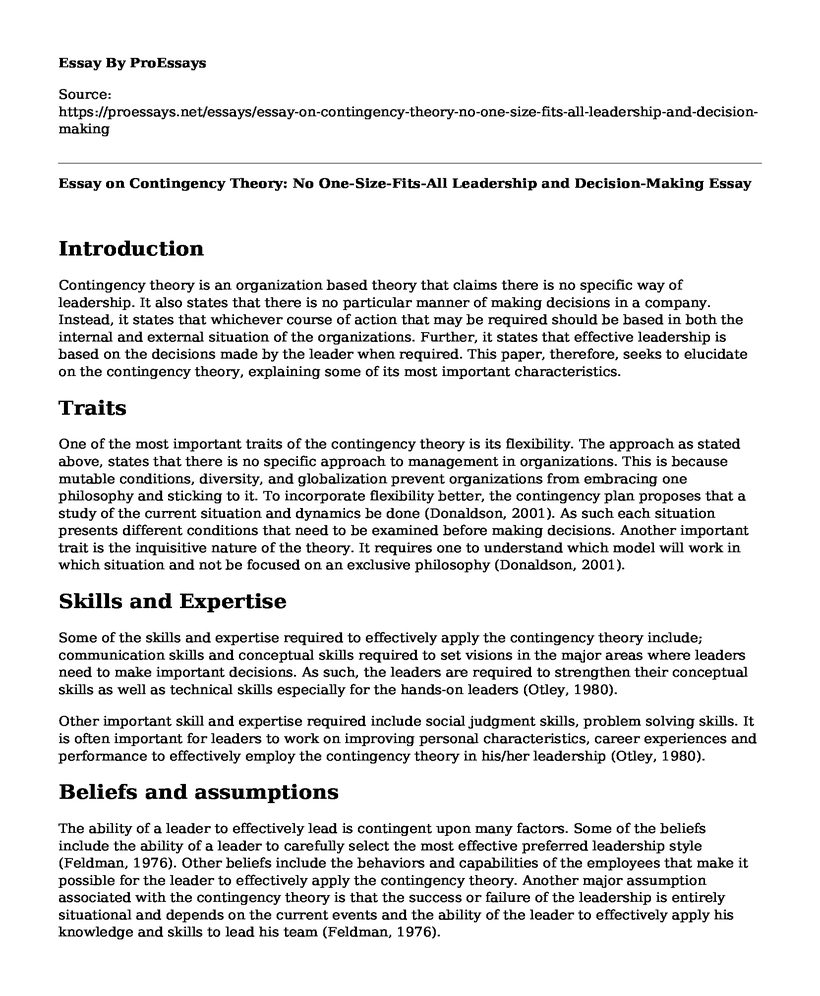Introduction
Contingency theory is an organization based theory that claims there is no specific way of leadership. It also states that there is no particular manner of making decisions in a company. Instead, it states that whichever course of action that may be required should be based in both the internal and external situation of the organizations. Further, it states that effective leadership is based on the decisions made by the leader when required. This paper, therefore, seeks to elucidate on the contingency theory, explaining some of its most important characteristics.
Traits
One of the most important traits of the contingency theory is its flexibility. The approach as stated above, states that there is no specific approach to management in organizations. This is because mutable conditions, diversity, and globalization prevent organizations from embracing one philosophy and sticking to it. To incorporate flexibility better, the contingency plan proposes that a study of the current situation and dynamics be done (Donaldson, 2001). As such each situation presents different conditions that need to be examined before making decisions. Another important trait is the inquisitive nature of the theory. It requires one to understand which model will work in which situation and not be focused on an exclusive philosophy (Donaldson, 2001).
Skills and Expertise
Some of the skills and expertise required to effectively apply the contingency theory include; communication skills and conceptual skills required to set visions in the major areas where leaders need to make important decisions. As such, the leaders are required to strengthen their conceptual skills as well as technical skills especially for the hands-on leaders (Otley, 1980).
Other important skill and expertise required include social judgment skills, problem solving skills. It is often important for leaders to work on improving personal characteristics, career experiences and performance to effectively employ the contingency theory in his/her leadership (Otley, 1980).
Beliefs and assumptions
The ability of a leader to effectively lead is contingent upon many factors. Some of the beliefs include the ability of a leader to carefully select the most effective preferred leadership style (Feldman, 1976). Other beliefs include the behaviors and capabilities of the employees that make it possible for the leader to effectively apply the contingency theory. Another major assumption associated with the contingency theory is that the success or failure of the leadership is entirely situational and depends on the current events and the ability of the leader to effectively apply his knowledge and skills to lead his team (Feldman, 1976).
References
Donaldson, L. (2001). The contingency theory of organizations. Sage.
Feldman, D. C. (1976). A contingency theory of socialization. Administrative science quarterly, 433-452.
Otley, D. T. (1980). The contingency theory of management accounting: achievement and prognosis. In Readings in accounting for management control (pp. 83-106). Springer, Boston, MA.
Cite this page
Essay on Contingency Theory: No One-Size-Fits-All Leadership and Decision-Making. (2023, Jan 04). Retrieved from https://proessays.net/essays/essay-on-contingency-theory-no-one-size-fits-all-leadership-and-decision-making
If you are the original author of this essay and no longer wish to have it published on the ProEssays website, please click below to request its removal:
- Essay Example on Evaluating Costing and Value Chain for Optimal Org Growth
- Forgiveness: Make a Deliberate Decision to Release Resentment - Essay Sample
- Paper Example on Computer Revolution: Must-Have for CEOs to Ensure Smooth Operations
- Essay Sample on Captain Avery's Golden Age of Piracy: Building a Community with Abused Men on Madagascar
- The 4 Leadership Theories in Organizational Management - Essay Sample
- Data Security Challenges: Computer Hacking Risks & Motivations - Essay Sample
- Managing Diversity and Decision-Making in Organizational Behavior: A Case Study Analysis







